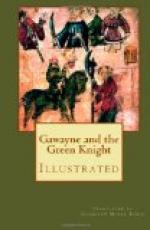Up jumped his host. “My friend, I like
your attitude,
And know no surer way to win heaven’s gratitude
Than sending thither just such men as you;
I’ll be your guide. But since you are not
due
At the Green Chapel till three nights from now,
And since the way is short, I’ll tell you how
The interim may be disposed of best:—
In short, let me propose a merry jest!”
At this Sir Gawayne gave a sudden start,
For some old memory seemed to clutch his heart,
And in the baron’s eyes he seemed to see
A twinkling gleam of green benignity
Not wholly strange; but like a flash ’t was
gone.
Gawayne sank back, and his good host went on:
“Two days you sojourn here, and while I take
My daily hunting in the wood, you make
My house and castle yours; and then, each night,
We’ll meet together here at candle-light,
And all my winnings in the wood, and all
That comes to you at home, whate’er befall,
We’ll give each other in exchange; in fine,
My fortune shall be yours, and yours be mine.”
To Gawayne this seemed generous indeed.
And with most cordial laughter he agreed.
They clasped hands o’er the bargain with good
zest,
And then all said good-night, and went to rest.
Next morning Gawayne was awakened early
From a deep slumber by the hurly-burly
Of footman, horseman, seneschal, and groom,
Bustling beneath the windows of his room.
He rose and looked out, just in time to see
The baron and a goodly company
Of huntsmen, armed with cross-bow, axe, and spear,
Ride through the castle gate and disappear.
And then, while Gawayne dressed, there came a knock
Upon his chamber door. He threw the lock,
And a boy page brought robes of ermine fur
And Tarsic silk,—black, white, and lavender,—
For his array, and with them a kind message,
Which the good knight received with no ill presage:
“Will brave Sir Gawayne spare an idle hour
For quiet converse in my lady’s bower?”
The boy led on, and Gawayne followed him
Through crooked corridors and archways dim,
Along low galleries echoing from afar,
And down a winding stair; then “Here we are!”
The page cried cheerily, and paused before
The massive carvings of an antique door.
This he swung open; and the knight passed through
Into a garden, fresh with summer dew!
A lady’s bower in Fairyland! What pen
Could make that strange enchantment live again?
Not he who drew Acrasia’s Bower of Bliss
And Phaedria’s happy isle could picture this.
That sweet-souled Puritan discerned too well
The serpent’s coil behind the witch’s
spell;
And he who saw—when the dark veil was torn—
The rose of Paradise without the thorn,
(Sublimest prophet, whose immortal verse
Lent mightier thunders to the primal curse),
Even he too sternly, in the soul’s defense,
Repressed the still importunate cries of sense.




